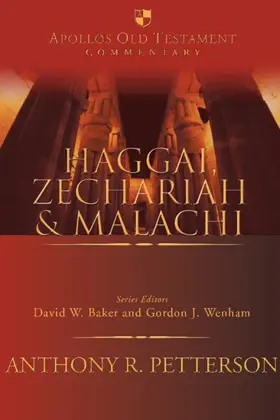

Haggai, Zechariah, and Malachi
in Apollos Old Testament Commentary
Pages
448
Publisher
IVP Academic
Published
4/27/2015
ISBN-13
9780830825240
The post-exilic prophetic books of Haggai, Zechariah and Malachi are set in times of great adversity. God's people are minnows in the vast Persian Empire, and the promises of the earlier prophets for a glorious restoration of Jerusalem seem far from their experience. These books, from beginning to end, restate God's intention to establish his glorious kingdom, and explain what this means for the lives of his people.
For Haggai and Zechariah, the immediate challenge was to rebuild the temple in view of God's return. For Malachi, the challenge was covenant unfaithfulness which had infected the people’s attitudes towards God, and how this needed to change in view of future judgment. God used each of these prophets to remind the people of the true King and to re-order their lives and their community in the light of the reality of his coming kingdom.
In this Apollos Old Testament Commentary, Anthony Petterson offers detailed commentary on these prophetic books, setting them in their wider biblical-theological context. He shows the connections between the post-exilic world and our own, and explains how these books contain a vital message for the church today, living in the gap between promise and reality.
For Haggai and Zechariah, the immediate challenge was to rebuild the temple in view of God's return. For Malachi, the challenge was covenant unfaithfulness which had infected the people’s attitudes towards God, and how this needed to change in view of future judgment. God used each of these prophets to remind the people of the true King and to re-order their lives and their community in the light of the reality of his coming kingdom.
In this Apollos Old Testament Commentary, Anthony Petterson offers detailed commentary on these prophetic books, setting them in their wider biblical-theological context. He shows the connections between the post-exilic world and our own, and explains how these books contain a vital message for the church today, living in the gap between promise and reality.
Collections
This book appears in the following featured collections.
- Basic Library Booklist by Detroit Baptist Theological Seminary
- Top Old Testament Commentaries by Engaging Scripture (Nijay Gupta's Substack)
- TGC: Preaching Commentaries by The Gospel Coalition
Reviews
Intended to serve the needs of those who preach from the Old Testament, Petterson offers detailed commentary on these three prophetic books, setting them in their wider biblical-theological context. His work shows the connections between the post-exilic world and our own. He explains how these books contain a vital message for the church today about living in the gap between promise and reality.
[Full Review]
Anthony R. Petterson’s Haggai, Zechariah & Malachi is one of the latest entries the Apollos Old Testament Commentary series. The series “aims to to take with equal seriousness the divine and human aspects of Scripture. It expounds the books of the Old Testament in a scholarly manner accessible to non-experts, and show s the relevance of the Old Testament to modern readers” (from back cover). That is a lofty and balanced aim, and on the whole this commentary is a masterful example of the series’s aims. Petterson respects the authority of Scripture as inspired while also working to understand the human elements of grammar and sociology that are at work in the text. The annotated translation gives notes on Hebrew lexicography and grammar with the Hebrew transliterated for those without Hebrew. The format is similar to that of the Word Biblical Commentary series with a translation, notes, form and structure, comment and finally explanation. Petterson puts this format to good use, keeping form and structure comments brief so that the bulk of the commentary falls in the “Comment” section. In the “Explanation” section he gives a summary of the meaning of the passage with a nod to biblical theology and even pastoral application.
Petterson includes a general introduction to the post-exilic prophets and individual individual introductions to each book. Petterson is sensitive to the canonical position of these books among the twelve, but he does not let that control exegesis. He places these books in the whole of the biblical canon, seeing their ultimate fulfillment in the coming of Jesus Christ. In the eschatological portions, Petterson often advocates an already/not yet reading. He first shows how eschatological portions can be seen as fulfilled in Christ and the church, however he also acknowledges that many passages seem to have a yet future fulfillment on earth. He is cautious not to elaborate much on how he sees those playing out (and at times left me wanting him to comment further!). He regularly makes the appropriate connections to the New Testament.
Petterson’s writing style is very readable, and his comments are thorough. His tone is irenic as he interacts with those with whom he disagrees. What struck me most of all was the common sense of his exegesis. In all of the parallels and cultural observations, he remained constantly attuned to the basic argument of the text. I often found myself wondering how everyone has not come to his conclusions, they seemed so clearly and cogently articulated!
Overall, for a through, semi-technical commentary written from an evangelical perspective, I believe this is now the best option for the post-exilic prophets. I heartily recommend it for pastors wanting to preach through these books.
IVP provided me with a free copy with no expectation of a favorable review.

